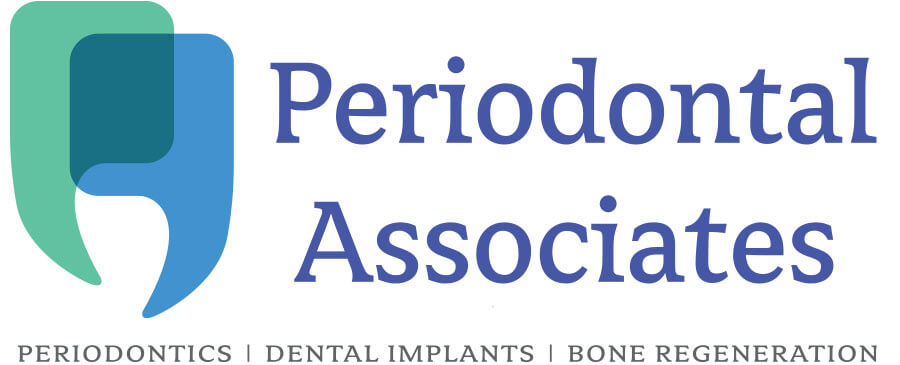
Periodontal Associates provides periodontics in Newton & Framingham, MA. Call or to learn more and schedule an appointment.
Periodontics involves the diagnosis, treatment and prevention of gum disease. A periodontist is a dentist who has completed additional years of specialty training in periodontics at a post-doctoral educational program. Dr. Feuerman and Dr. Castellucci are certified periodontists, each with over 40 years of experience, and provide expert periodontal care.
Periodontal Disease is a bacterial infection of the gums, bone and ligaments that support the teeth and anchor them in the jaw. The bacteria are normal inhabitants of the mouth and form a film of dental plaque and calculus (tartar) which stick to the teeth. The bacteria produce poisonous toxins which stimulate the immune response to fight the infection. If the disease process is not stopped, the supporting structures of the teeth will continue to be destroyed. This eventually leads to tooth loss.
Periodontal disease can occur at any age. Over half of all people over the age of 18 have some form of the disease. After age 35, over 75% of all people are affected. Unfortunately, the disease process is usually asymptomatic and painless. The disease can be easily detected during regular dental examinations.
The most common types of periodontal disease are GINGIVITIS and PERIODONTITIS.
Healthy Gums and Bone
Gums appear light pink and are sharply defined. Bone completely surrounds the roots of the teeth. Teeth are firmly anchored into the bone.
Gingivitis
Gingivitis is infection of the gingiva (gum tissue), and is the initial stage of the disease process. Gums become red, swollen and may bleed easily. Underlying bone levels are unaffected.
Periodontitis
Periodontitis is classified as being Mild, Moderate or Severe, depending upon the amount of destruction to the gums, ligaments and bone that surround teeth. As the disease progresses, gums separate from the teeth and form gum pockets. These pockets get deeper as more underlying bone is destroyed. Gum pockets will collect increasing amounts of bacterial plaque and calculus (tartar) as the disease process worsens. Teeth will loosen as more bone is lost.
Contributing Factors to Periodontal Disease
The response of the gums and bone to dental plaque may be modified by one or more of the following factors.
- Poorly fitting dental restorations
- Smoking
- Crowded teeth, improper bite alignment
- Clenching or grinding of teeth
- Hormonal changes, including pregnancy, menstruation and menopause
- Diet
- Systemic diseases, including blood disorders and diabetes
- Medications, including calcium channel blockers and anti-convulsants
Warning Signs of Periodontal Disease
- Bleeding gums
- Tenderness, swelling, red color
- Abscess ( pus oozing from the gums )
- Foul odor
- Loose teeth
- Pain
Treatment of Periodontal Disease
Periodontal treatment is performed to eliminate disease from the tissue that surrounds the teeth and to restore health. Healthy gums are critical to overall oral hygiene and health.
Non-Surgical Treatment
Scaling and root planing is a non-surgical procedure used to treat gum disease. During the scaling process, specialized dental instruments are used to remove dental plaque and calculus from beneath the gums. Planing is the procedure used to smooth the tooth’s root after the scaling process. Root planing helps the gums heal and reattach themselves to a cleaner and smoother root surface. Ultrasonic instruments are often used to help clean the teeth.
Dental lasers may also be used to detoxify the diseased gum tissue and help promote healing, including re-attachment of the gums to the teeth. Dental laser surgery uses a beam of intense light to correct a wide range of gum conditions. The energy produced by the laser cuts or vaporizes the tissue it is concentrated on. Stitches are not necessary, and there is a minimal risk of infection or bleeding with this conservative treatment.
Surgical Treatment
Osseous (bone) surgery is a surgical procedure used to smooth and reshape affected bone under the gum tissue. This procedure is performed when a pocket in the gums has formed around a tooth (or teeth). Bacteria can get into these pockets and damage bone, resulting in bone loss and ultimately, tooth loss. During osseous surgery the gum is “flapped” to expose the root of the tooth. The bone is reshaped and the gum sutured back into place. The pocket is minimized to the ideal probing depth (1-3 mm).
Other treatments that may be necessary to treat periodontal disease include:
- Bone grafts
- Gum grafts
- Cosmetic plastic surgery
- Fabrication of mouth guards
- Bonding of teeth
- Orthodontics
- Medications (antibiotics, flouride, antimicrobial rinses)
Relationship of Gum Disease to Overall Medical Health
Periodontal disease has been linked to heart disease, stroke, diabetes, pregnancy problems, and other health concerns.
Heart Disease
Several theories exist to explain the link between periodontal disease and heart disease. One theory is that oral bacteria can affect the heart when they enter the blood stream, attaching to fatty plaques in the coronary arteries (heart blood vessels) and contributing to clot formation. Coronary artery disease is characterized by a thickening of the walls of the coronary arteries due to the buildup of fatty proteins. Blood clots can block normal blood flow, restricting the amount of nutrients and oxygen required for the heart to function properly. This may lead to heart attacks.
Another possibility is that the inflammation caused by periodontal disease increases plaque buildup, which may contribute to swelling of the arteries.
Researchers have found that people with periodontal disease are almost twice as likely to suffer from coronary artery disease as those without periodontal disease.
Periodontal disease can also exacerbate existing heart conditions. Patients at risk for infective endocarditis may require antibiotics prior to dental procedures. Your periodontist and cardiologist will be able to determine if your heart condition requires use of antibiotics prior to dental procedures.
Stroke
Additional studies have pointed to a relationship between periodontal disease and stroke. In one study that looked at the causal relationship of oral infection as a risk factor for stroke, people diagnosed with acute reduction of blood flow to the brain were found more likely to have an oral infection when compared to those in the control group.
Diabetes
Diabetic patients are more likely to develop periodontal disease, probably because diabetics are more prone to contracting infections. This can increase blood sugar and lead to diabetic complications. Those people who don’t have their diabetes under control are especially at risk. Research suggests that the relationship between periodontal disease and diabetes goes both ways – periodontal disease may make it more difficult for people who have diabetes to control their blood sugar. Therefore, it is very important for people with Diabetes to treat gum disease and maintain the long term health of their gums.
Pregnancy Problems
Respiratory Problems
Scientists have found that bacteria that grow in the oral cavity can be inhaled into the lower parts of the lung to cause respiratory diseases such as pneumonia, especially in people with periodontal disease. This discovery leads researchers to believe that these respiratory bacteria can travel from the oral cavity into the lungs to cause infection.
Osteoporosis
Researchers have suggested that a link between osteoporosis and bone loss in the jaw. Studies suggest that osteoporosis may lead to tooth loss because the density of the bone that supports the teeth may be decreased, which means the teeth no longer have a solid foundation. Bone loss may progress more rapidly in softer, less dense bone. However, hormone replacement therapy may offer some protection.
Bisphosphonates: Implications for Your Periodontal Therapy
Recently, there has been information in the news about taking bisphosphonates and the implications on your periodontal health. Oftentimes, women with osteoporosis are treated with bisphosphonates such as Fosamax, Actonel, Boniva, and Reclast. Intravenous and long term use of these medications has been linked to the development of osteonecrosis of the jaw (ONJ) when undergoing certain oral surgical and periodontal procedures.
